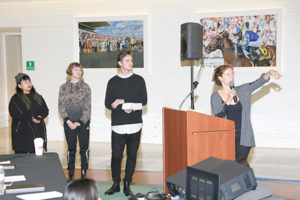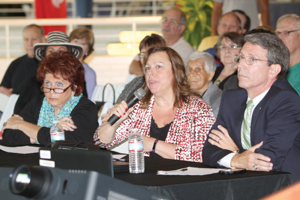The first question was a dud, but in a revealing way.
College students competing to devise digital and non-digital solutions to aging well asked the panelists a logical question: "What kinds of smartphones do you use?"

Paige Landesberg, a student at the School of the Art Institute of Chicago, presents her team's winning proposal at the AMITA Health "hackathon" on Oct. 15-16 in suburban Chicago. Twelve teams from 10 area colleges and universities spent the weekend questioning panelists and then devising ideas for improving the lives of the elderly.
"We don't use smartphones," came the answer.
Maybe it shouldn't have been a surprise, given that panel members ranged in age from 85 to 91. One held up a flip phone, which he usually keeps turned off.
Clearly, developing clever "apps" for seniors wasn't the way to go for the college teams brainstorming breakthrough ideas at an "open innovation forum" organized by AMITA Health. Based in suburban Chicago, AMITA Health is the joint operating company of Alexian Brothers Health System and Adventist Midwest Health.
Racing the clock
The two-day event was modeled on a "hackathon" competition. Hackathons, which originated in the fields of Internet technology and engineering, are caffeine-fueled, freewheeling idea laboratories that go all night — perfect for people of college age.
AMITA Health held its event, formally called a health care design challenge, on the weekend of Oct. 15-16 in a ballroom at the Arlington International Racecourse, a horse track in Arlington Heights, Ill. AMITA Health and AMITA Health Alexian Brothers Health System share a headquarters in the northwest suburb.

Shirlanne Lemm, a judge for the health care design challenge for Chicago-area students, speaks during the award presentation. Other judges include Lauri Stone, left, former president of the Schaumberg Business Association, and Arlington Heights Mayor Tom Hayes, right. Lemm is president and chief executive of the Elk Grove Chamber of Commerce.
The 12 teams of students from 10 area universities and colleges brought sleeping bags, comfortable clothes, curiosity and energy. AMITA convened six panels of experts, including people from health care and insurance. There also were two panels of people directly affected by aging — older adults and their adult children.
Simple solutions
The teams of three to five students each took turns peppering the panelists with questions, then adjourned to their backpack piles. AMITA provided coffee, sandwiches and healthy snacks. Nobody got much sleep.
The next day, teams arranged displays of their ideas as they would at a science fair. Judges reviewed them and picked winners, with cash prizes as sweeteners.
Jeff Oberlin, director of the AMITA Health Center for Innovation, said once competing teams moved past the realization that their elders aren't glued to social media, they began working on basic issues such as loneliness and uneven diets.
"For many of the students, the learning was in seeing that simple solutions are better than complex ones," Oberlin said. "They came to understand the need to find practical ways to help older adults maintain their independence, stay in their homes and maintain social connections, such as family and church."
Future self
Oberlin said the panel of elders was a big hit with students. "They were all spry and sharp, and cracked jokes about getting old and trying to live well," he said of the panelists. "They told the students, 'Someday, you're going to be this old. So think about how to prepare for it.'"

Patrick Nora, right, a nursing student at Harper College in suburban Chicago, presents his team's ideas during the AMITA Health "hackathon." With him is teammate Dylan Giesel.
Many of the teams applied computer technology to their proposals, but sought to blend it with more practical things. For example, the first prize went to a team of students from the School of the Art Institute of Chicago who rigged a standard alarm clock with an attached touch screen device that would allow people to send a simple numerical update of their well-being to family members — ranging from "10" for a good morning to "1" for a bad one. The team's notion was to add instant communication to a familiar device.
Some teams tried to deal with improving social connections and diet. Patrick Nora, a nursing student at Harper College near the racetrack, said his group proposed ride services and cooking classes to encourage older people to socialize.
Nora, 23, brought to the hackathon his experience working in assisted living and hospice. He said people want human interaction, not phone apps.
"Many older people are lonely," Nora said. "For them, a big deal is getting out to the library or to church. We have the medicines to make people grow older. Now we need to improve the quality of life. I want that for my family and my community."
He said cooking classes would be good for social connections and encouraging healthy diets, especially for people with diabetes and other chronic illnesses. His team's idea tied for third place.
As for sleep, Nora said he got "a solid 15 minutes. It was fun to push ourselves."
Blank canvas
Oberlin said AMITA has no property right to any of the teams' proposals. The winners, for example, could try to develop their idea of a smart alarm clock. He said the health system will study all of them for possible application to care.
When an AMITA steering committee last year began discussing ideas for a student hackathon, its members kept coming back to the needs of older adults. Oberlin said the reasons were both the nation's growing population of older people and the assumption that most 20 year olds don't spend much time thinking about their elders. The challenge would be to elicit fresh ideas on something that, for the students, would be a relatively new subject.
"These students are not in the mainstream of health care," he said. "So if you have the perspective of being detached from a subject, there is potential for coming up with unique solutions."
He said AMITA leaders, panelists and students were pleased with the experience and results. "My boss wants to do it again next year," Oberlin said.
The suburban Daily Herald newspaper was AMITA's co-sponsor for the hackathon. Student teams also represented the University of Chicago, and DePaul, Northwestern and Dominican universities.
Copyright © 2016 by the Catholic Health Association
of the United States
For reprint permission, contact Betty Crosby or call (314) 253-3477.